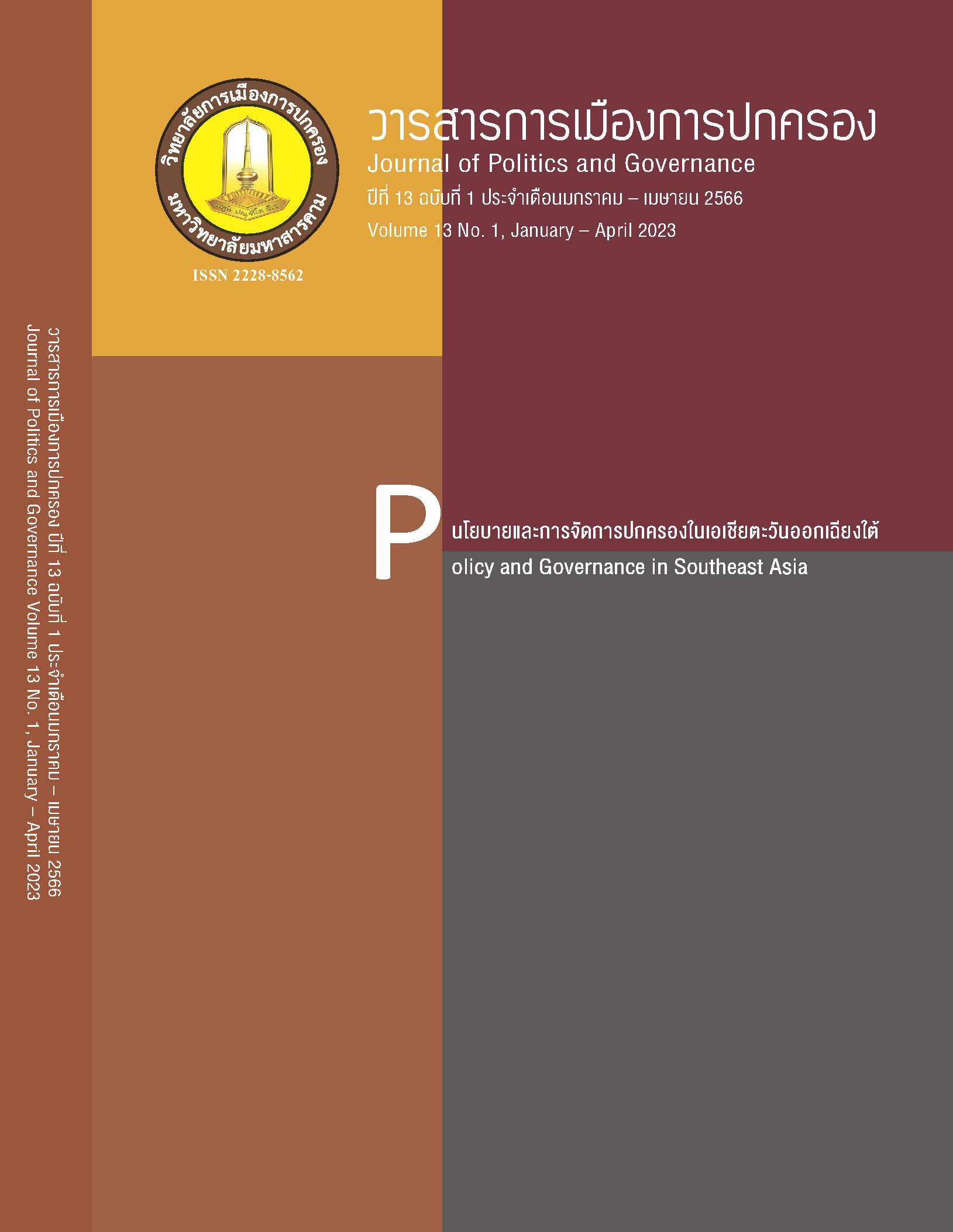Analysis of Case Study Based on Sociological Theory in Different School of Thoughts: The Gap and Different Thoughts of Politics of Two Age Groups
Main Article Content
Abstract
A social phenomenon challenging the democracy system in Thailand is political dissent between two age groups. It has become society’s concern and questions whether it causes any conflict and disharmony difficultly to solve. The purposes of this article are to examine the political perspective and expression of two age groups and to explain the phenomena, gap, and difference of political thought of two age groups through Sociology Theory in different schools of thought: Phenomenology Theory and Cultural Ecology Theory. According to review literature and point of view of academicians in politics and government, and sociology, it found that political perspective and expression of two age groups; the first group: most of the baby boomer, generation X, and some generation Y that has the subject-participant culture perspective are bored political issue and not interested in political participation. The second group: some generation Y and generation Z that have the participant political culture perspective are increasingly interested in political issues, have the courage to give their opinion in public and encourage political activities creatively to create political change. To explain phenomena through Phenomenology Theory found that the gap and different thoughts of politics of each age group is a result of different experiences and perceptions causing clearly different political behavior and expression. According to Cultural Ecology Theory, it pays attention to different environments causing different political adjustments and expression of each age group, especially information technology development.
Article Details
References
กัญจิรา วิจิตรวัชรารักษ์. (2563). การตื่นตัวทางการเมืองของคนรุ่นใหม่ในประเทศไทย. วารสารสถาบันวิจัยญาณสังวร, 11(1), 91-103.
กันต์พงศ์ ทวีสุข. (2561). ช่องว่างระหว่างวัยทางการเมือง. สืบค้นจากhttp://www.kanpongt.com/blog/gengapinpolitics/
จามะรี เชียงทอง. (2549). สังคมวิทยาการพัฒนา.กรุงเทพฯ: โอ.เอส.พริ้นติ้ง เฮ้าส์.
ฉาย บุญนาค. (2562). ช่องว่างระหว่างวัย อีกหนึ่งภารกิจที่ รบ.ประยุทธ์ 2 ห้ามมองข้าม. สืบค้นจากhttps://www.bangkokbiznews.com/blog/detail/647770
ไชยันต์ ไชยพร. (2562). ช่องว่างทางการเมืองระหว่างวัย. สืบค้นจาก https://www.chula.ac.th/cuinside/24101/
ทัศนีย์ ทองสว่าง. (2549). สังคมวิทยา. กรุงเทพฯ: โอ.เอส.พริ้นติ้ง เฮ้าส์.
นภดล นพรัตน์. (2563). Generation Gap (ช่องว่างระหว่างวัย ความเข้าใจที่แตกต่าง). สืบค้นจาก https://acrosswork.co.th/2018/10/generation-gap
นิภา วิริยะพิพัฒน์. (2559). บทบาทของ HRM: การจัดการช่องว่างระหว่างวัยในองค์กร. วารสารวิชาการและวิจัย มทร.พระนคร สาขามนุษยศาสตร์และสังคมศาสตร์, 1(2), 73-88.
นิยพรรณ วรรณศิริ. (2540). มานุษยวิทยาสังคมและวัฒนธรรม. กรุงเทพฯ: สำนักพิมพ์มหาวิทยาลัยเกษตรศาสตร์.
ประชาชาติธุรกิจออนไลน์. (2563). เปิดโผรายชื่อดาวเด่นม็อบนักศึกษาขึ้นปราศรัย 19-20 กันยายนนี้. สืบค้นจาก https://www.prachachat.net/politics/news-523999
พัชรินทร์ สิรสุนทร. (2556). แนวคิด ทฤษฎี เทคนิค และการประยุกต์เพื่อการพัฒนาสังคม. กรุงเทพฯ: บริษัท วี.พริ้นท์ (1991) จำกัด.
วรวรรณ ธาราภูมิ. (2563). ความคาดหวังกับความจริงเรื่องม็อบ 19 ก.ย. 63. สืบค้นจาก https://www.facebook.com/profile.php?id=1450051196
วิทยากร เชียงกูล. (2552). จิตวิทยาวัยรุ่น: ก้าวข้ามปัญหาและพัฒนาศักยภาพด้านบวก. กรุงเทพฯ: สำนักพิมพ์สายธาร.
สุภางค์ จันทวานิช. (2557). ทฤษฎีสังคมวิทยา (พิมพ์ครั้งที่ 6). กรุงเทพฯ: บริษัท วี.พริ้นท์ (1991) จำกัด.
สมบัติ ธำรงธัญวงศ์. (2548). การเมือง: แนวคิดและการพัฒนา. กรุงเทพฯ: เสมาธรรม.
อมร รักษาสัตย์. (2544). การเมืองการปกครองไทยตามรัฐธรรมนูญฉบับประชาชน. กรุงเทพฯ: สำนักพิมพ์แห่งจุฬาลงกรณ์มหาวิทยาลัย.
เอนก เหล่าธรรมทัศน์. (2556). การเมืองของพลเมืองสู่สหัสวรรษใหม่. กรุงเทพฯ: สำนักพิมพ์คบไฟ.
อรวรรณ สว่างอารมณ์. (2563). การศึกษาวัฒนธรรมทางการเมืองของพลเมือง 4 รุ่น: กรณีศึกษาอำเภอวังน้อย จังหวัดพระนครศรีอยุธยา. วารสารพัฒนาสังคม, 23(1), 163-180.
Gabriel A. Almond & Sidney V. (1965). Political Culture and Political Development. Princeton: Princeton University Press.
Solomon, R.M. (2009). Consumer behavior: buying, having and being (9thed.). Upper SaddleRiver, NJ: Pearson Prentice Hall.
The Bangkok Insight Editorial Team. (2020). ข้อเรียกร้องชุมนุม 19 กันยา. Retrieved from https://www.thebangkokinsight.com/437943/
Yooprot. T. (2013). Effect of Work Values on Organizational Citizenship Behavior Among the Generations. Journal of Business Administration, Thammasart University, 36(138), 40-62.


